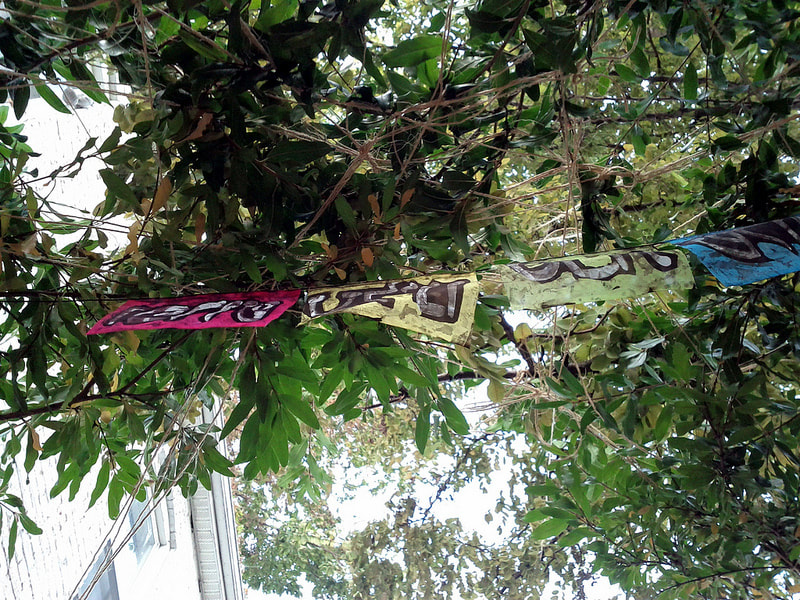|
Israel should not forget that it was the Lord that released them from the bondage of Egypt and led them through the wilderness for 40 years until they were ready to enter the Promised Land. In their journey through the wilderness Israel encountered different terrain, each of which had its own challenges. There are certain aspects of the Feast of Tabernacles (to take place for seven days, beginning on the 15th day of the 7th month - Leviticus 23:34) that are meant to be remembered through symbols. The people were to build booths with roofs that remained open at the top so that they could see the sky and commemorate the time when they dwelt in tents and wandered through the wilderness. As the Israelites looked up from their temporary booths, or Sukkahs, they were able to look up at the stars and remember God's promise to Abraham that his descendants would be as numerous as the stars.
Leviticus 23:40 and Nehemiah 8:15 instruct us to gather the fruits of the harvest and cut specific types of branches to use as a wave offering to the Lord and coverings on the roof of the Sukkah. In his Book of Mysteries, Jonathan Cahn defines the Hebrew word lulav as a cluster of branches used to worship God during the Feast of Tabernacles. The lulav consists of three different species of plants, each one reminding us of a specific place in the journey through the wilderness. As the palm tree grows in the valleys, its fronds remind God's people of their walk through the valley. The journey through the mountains would be represented by the myrtle branch. The willow, that grows near the water, would be a reminder that God gives water in the desert places. Jonathan tells us, "The wilderness is the world; the journey is this life. And to the child of God, this is the message of the lulav: The palm tells you that no matter what valley you go through in your life, no matter how dark and deep, you will never be alone. He will be with you. And the myrtle tells you that when you go through the rockiest of times, He will go through it with you and will keep you from falling. And the willow tells you that in the dry and empty places of your life, He will never leave you, but will stay close, and will even give you rivers in the desert." The roof of the Sukkah is not only covered by the branches of the lulav, but also the fruit of our harvest. Of course, fruit speaks of the Promised Land. We are all on a journey to our land of promise. It is God's will that we "bear much fruit" so that we show ourselves to be His disciples. (John 15:8) As we journey through life, we will encounter valleys, mountains and dry places. We should remember the lessons of the lulav: "God goes with us; He will never leave or forsake us." (Deuteronomy 31:6) His desire is that we make it through every landscape that we encounter and that we produce fruit in every circumstance. Here is what the prophet Isaiah said to the Israelites: "Fear not, for I have redeemed you; I have summoned you by name; you are mine. When you pass through the waters, I will be with you; and when you pass through the rivers, they will not sweep over you. When you walk through the fire, you will not be burned; the flames will not set you ablaze. For I am the Lord, your God, the Holy One of Israel, your Savior..." (Isaiah 43:1-3) The shepherd king, David, knew the truth of this and wrote about God's faithfulness as a shepherd in Psalm 23. "...He makes me lie down in green pastures. He leads me beside quiet waters; He restores my soul. He guides me in paths of righteousness for His name's sake...I will fear no evil, for you are with me...Surely goodness and love/mercy will follow me all the days of my life, and I will dwell in the house of the Lord forever." Let us remember the faithfulness of God and how He cared for the Israelites as they traveled through the wilderness. One of the lessons of the Feast of Tabernacles is the affirmation of His faithfulness and the truth that one day we will tabernacle with Him at His table. The branches of the lulav and fruit of the harvest symbolize God's care over us today. Let us remember the message of these elements--a message from the Old Testament that has meaning for us today. By faith, grab hold of the truth and let it comfort and encourage you throughout the journey of life. This time last year I was preparing for my wedding which was to take place on October 27. As I journaled with God about the amount of time involved in preparations, He confirmed that planning wedding celebrations does take much thought and work. Then He reminded me that He too was planning an amazing wedding super for His Son. Every detail for that day has already been worked out. In addition, He said, "The invitations have been issued, but many have not responded." God went on: "I am waiting for more positive responses to come to me. I am waiting for the fullness of the Gentiles to come in and more invitations are being sent to the Jews. I look forward to a glorious time of fellowship together around the table. Joan, you will be blown away by the extravagant, lavish table I set."
It was so exciting for me to read this part of my journal, especially since we are in the season of the fall feasts and are beginning to celebrate the Feast of Tabernacles or Sukkot. It is also called, the "Feast of Ingathering" because it occurs during the greatest feast of the year. Fruit and vegetables and the remainder of the wheat are harvested. The abundance of the agricultural harvest provides for an overflowing table. Indeed, this Feast is for celebrating the harvest, but should also remind us of how the Israelites dwelt in tents as they wandered through the wilderness, and how the Lord provided for all their needs. It is also a reminder of our humble beginnings and that our time on earth is temporary. Along with thanking God for the harvest, the Jewish people ask Him to provide rain for the next season. The Feast of Tabernacles is characterized by joy as we remember God's faithfulness and contemplate meeting Him face-to-face at His table. This is a time when God tabernacles (meets and dwells with) us. Deuteronomy 16:14-17 says this about the Feast: "Be joyful at your Feast. For seven days celebrate the Feast to the Lord your God at the place the Lord will choose. For the Lord your God will bless you in all your harvest and in all the work of your hands, and your joy will be complete...No man should appear before the Lord empty-handed. Each of you must bring a gift in proportion to the way the Lord your God has blessed you." The Israelites used to bring their gifts to the priest who sang a song from Isaiah 12:3-6. "With joy you will draw water from the wells of salvation. In that day you will say: 'Give thanks to the Lord, call on His name; make known among the nations what He has done, and proclaim that His name is exalted. Sing to the Lord, for He has done glorious things; let this be known to all the world. Shout aloud and sing for joy, people of Zion, for great is the Holy One of Israel among you.'" It was my desire, as I was preparing for my wedding, to find the perfect gift for my husband to be. One day a throng of Believers from every tribe and nation will gather together at the marriage supper of the Lamb. Father God will have a glorious table set for us. Somehow, each of us will be able to sit by our Bridegroom and look in His eyes. In the meantime, we must make ourselves ready for this glorious day. The Bible says that our works/deeds will follow us to heaven. (Revelation 14:13) We will be rewarded for those works that were motivated by the Holy Spirit. Those accepted by God will be given crowns that can be laid at the feet of Jesus. This will be our gift to our Bridegroom. This week we have a glorious opportunity to tabernacle with Jesus and to store up treasures in heaven. (Matthew 6:20-21) The September magazine from The Voice of the Martyrs begins with a letter from their president, Cole Richards. The title caught my attention: "When We Deny Christ." The magazine contains stories of two individuals who denied Christ, primarily because of fear of persecution. A difficult question is posed to the reader: "What about when (not if) we deny Him?" Cole reminds us, "Even if we do not verbalize our denial as the Apostle Peter did, do we not deny Christ with our passivity and inaction when we fail to take opportunities to bear witness to His glory, truth and love? Our failure to speak up is exactly the same failure as Peter's denial if we join him in dissociating ourselves from the King of Kings. Peter twice insisted, 'I don't know the man!' (Matthew 26:72, 74) Like Peter, we fail. And, like Peter, the Lord desires to restore us." (John 21:15-17)
Stories of tortured Christians that appear in The Voice of the Martyrs are not for the faint of heart. The goal of the torturers is to make their prisoners deny God by putting them through horrific physical and mental torture. Can anyone blame these Christians when they buckle under the pressure of pain and deprivation? Have you ever asked yourself, "Would I be able to endure torture and not deny my God?" We may not have to face imprisonment and torture, but how many opportunities have we missed to witness to the glory and love of Jesus? Matthew, Mark and Luke all wrote about the words of Jesus to His disciples, "Then He said to them all: 'If anyone would come after me, he must deny himself and take up his cross daily and follow me. For whoever wants to save his life will lose it, but whoever loses his life for me will save it...If anyone is ashamed of me and my words, the Son of Man will be ashamed of him when he comes in His glory and in the glory of the Father and of the holy angels.'" (Luke 9:23-26) Jesus warned that following Him would mean taking up our crosses daily. It seems that some people have a heavier cross to carry than others. The Lord knows we are made of dust. Despite our failures, He has made provision for us on The Cross. "But He was pierced for our transgressions, He was crushed for our iniquities; the punishment that brought us peace was upon Him, and by His wounds we are healed. We all, like sheep, have gone astray, each of us has turned to his own way; and the Lord has laid on Him the iniquity of us all." (Isaiah 53:5-6) The Psalmist tells us this: "As far as the east is from the west, so far has He removed our transgressions from us." (Psalm 103:12) I want to be ready to pick up my cross daily and have thought of a couple of ways to be prepared. First, we must follow the advice of 1 Peter 3:15. "But in your heart set apart Christ as Lord. Always be prepared to give an answer to everyone who asks you to give the reason for the hope that you have. But do this with gentleness and respect." Second, we must ask God to empower us so that we will step out boldly for Him. Acts 4:23-31 tells about the threats that came to the disciples and what happened after they prayed. "After they prayed, the place where they were meeting was shaken. And they were all filled with the Holy Spirit and spoke the word of God boldly." Jesus sits at the right hand of God the Father and intercedes for us. (Hebrews 7:25) He wants us to succeed. We should be praying for ourselves to have the strength and grace we need to speak about the love of Jesus. Our prayers should also be for our brothers and sisters who are being persecuted. Let us pray for them as Cole Richards suggests--that they "endure torture and hardship for the name of Christ," and will be "strengthened when they face temptations to deny Him." May the lives of the persecuted Christians challenge us to stand firmly for Christ.
L'Shanah Tovah! -- "For a good year!" Here we stand, at the threshold of the new year (5779). The shofars will be blown to herald this year and celebrate Rosh Hashanah--the head of the year. Leviticus 23:24-25 explains that on the first day of the seventh month we are to have a day of rest and a sacred assembly commemorated with trumpet blasts. This day is also called "Yom Teru'ah" or the "Day of Blowing." It begins a 10-day period called the Days of Awe that ends with Yom Kippur (Day of Atonement), a day of fasting and prayer and a time to get right with the Lord. God's intention for this season is that we are awakened to seek Him wholeheartedly. For believers in Yeshua, the fall feasts prophecy the Lord's second coming. Colossians 2:17 says that they are a shadow of Messiah. When Messiah returns He will "come down from heaven, with a loud command, with the voice of the archangel and with the trumpet call of God..." (1 Thessalonians 4:16) The new year is a reminder that God will do a new thing and that one day He will return to the blast of the shofar to gather His bride unto Himself. It is a reminder that we need to be prepared as the Bride of Christ. The shofar blast is also a call for repentance of God's people. It is a time for us to reflect on life and return to the Lord. The fall feasts always occur in the seventh month on the Hebrew calendar, Tishrei. Sevens are important in God's Kingdom. "By the seventh day God had finished the work He had been doing; so, on the seventh day He rested from all His work. And God blessed the seventh day and made it holy, because on it He rested from all the work of creating that He had done." (Genesis 2:2-3) God ordained that Tishrei would be a holy month and a month of rest. Seven signifies completion, fullness and perfection. The fall feasts are meant for us to return to God to experience His glory. I believe that when we honor God's appointed feasts we set ourselves up to encounter His glory. Prophets are already weighing in on the significance of the year 5779. Prophet and evangelist, Doug Addison, reminds us that during the Days of Awe the heavens are much more open for dreams and visions and heavenly encounters. For those who have had things lost or stolen over the past seven years, he says that this is the season of repayment and justice. He says there is a strong breakthrough anointing for us. "One who breaks open the way will go up before them; they will break through the gate and go out. Their king will pass through before them, the Lord at their head." (Micah 2:13) Curt Landry, a Messianic Rabbi who lives and ministers in Israel, believes that the year will be one of exponential growth for the Kingdom of God. He says, "The number nine symbolizes both judgment and divine completeness. Our Messiah died at the ninth hour of the day (3:00 p.m.), representing the judgment of hell, death, and the grave. However, it is also written that it was the ninth hour of the day when Cornelius, a Roman Centurion, was instructed in a vision to contact the Apostle Peter and become the first recorded Gentile to convert and become born again.” (Acts 10:1-3) Landry believes this will be a year of great possibilities and of realigning with God's purposes and ways. I am remembering that nine is the number of the Holy Spirit and the fruits of the Spirit. Isn't it interesting that Tishrei is associated with the tribe of Ephraim which means double fruit? I believe we should be embracing everything that God has for us in this season. When Jesus came to earth He was called the "Firstfruit" of God. Jesus and Holy Spirit were demonstrations of the Spring and Summer feasts. One day Messiah will return to gather us together for the grandest celebration we can imagine. God Himself will "bring all things in heaven and on earth together under one head, even Christ." (Ephesians 1:10) Then we will have the completion of the fall feasts. In view of all of this, we should live according to 1 John 3:2-3. "...We know that when He appears, we shall be like Him, for we shall see Him as He is. Everyone who has this hope in Him purifies himself, just as He is pure." Will we be ready when He returns? Be awakened! This is a new day! "Sow for yourselves righteousness, reap the fruit of unfailing love, and break up your unplowed ground; for it is time to seek the Lord, until He comes and showers righteousness on you." (Hosea 10:12) Sitting at a table in a restaurant that overlooked the Maine coast, we watched as a flock of gulls flew onto the lawn to wait for someone to throw them some food. After a few minutes, many of the gulls left because nothing was immediately forthcoming. However, the few who remained were rewarded for their persistence. In fact, a restaurant employee threw out an entire piece of bread that was caught by one of the gulls who was in the right place at the right time. We watched in amazement as he consumed the entire piece.
The gull did two things right. He remembered where he had been fed before, and he waited patiently for what was to come. The children of Israel were taught the importance of remembering what God had done. "But remember the Lord your God, for it is He who gives you the ability to produce wealth, and so confirms His covenant, which He swore to your ancestors, as it is today." (Deuteronomy 8:18) "Remember the wonders He has done, His miracles, and the judgments He pronounced." (Psalm 105:5) It is in the remembering that we will go to the right place to connect with the Lord and receive His abundant blessings for us. Scripture is filled with instructions to wait upon the Lord. The Psalmist tells us his own experience with waiting. "I waited patiently for the Lord; He turned to me and heard my cry." (Psalm 40:1) I love what Isaiah tells us about the Lord's desire to bless us. "Yet, the Lord longs to be gracious to you; He rises to show you compassion. For the Lord is a God of justice. Blessed are those who wait for Him! (Isaiah 30:18) When Jesus walked the earth He was followed by crowds. They heard about how He healed those that He touched. In Matthew 14:13-21, we read about a crowd of 5,000 who followed Him. Jesus took five loaves of bread and two fish, gave thanks, and then fed that entire crown. In addition, there were 12 baskets full of bread left over. Later, a crowd of 4,000 followed Jesus as He healed their lame, blind, crippled and mute. For three days they went without food to be with Jesus. This time He took seven loaves and a few small fish, gave thanks, feed them all, and had left overs. (Matthew 15:30-38) Shortly thereafter, when Jesus was with His disciples, He reminded them of these times. "...Don't you remember the five loaves for the 5,000, and how many basketfuls you gathered?" (Matthew 16:9) Those who remembered how Jesus healed and fed the people positioned themselves to receive a blessing. As they waited they received immeasurably more than they could have imagined. (Ephesians 3:20) The Lord is looking for a people of faith so that He can be gracious to them and bless them. Remember the faithfulness of the Lord and wait for Him. Let your hunger for the things of God grow. We must be willing to wait on Him to be satisfied. He knows what we need and is ready to give it to us. |
Joan E. MathiasCategories
All
Archives
July 2024
|





 RSS Feed
RSS Feed